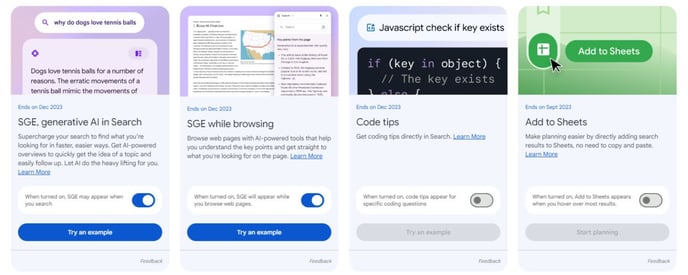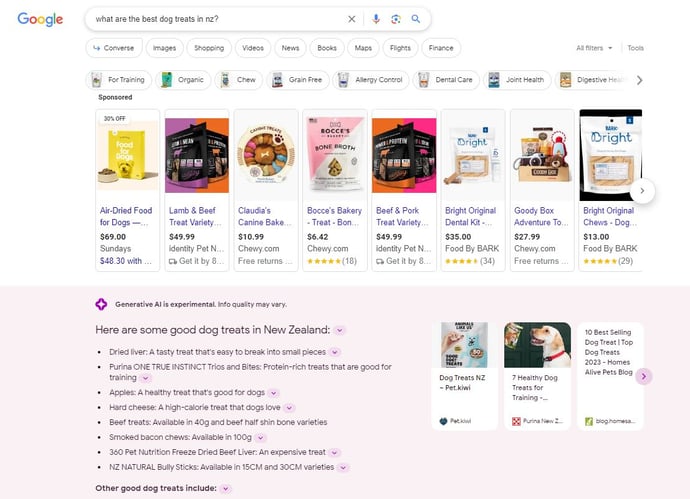.png)
First Published: 30 August, 2023
From ChatGPT to Google's search generative experience (SGE), developments in artificial intelligence are reshaping the user experience online and influencing how businesses should market themselves.
Creating effective paid advertising and organic content that ranks has always been a balance for marketers; how will the evolution of Google's search engine results page (SERPs) impact marketing efforts?
For marketers traversing this landscape, what can they do to ensure their Google search ads and organic content feature in search? We delve into this below, exploring the evolution of the SERPs, how AI developments are changing the search experience, and what this means for paid and organic content.
From the beginning, Google's search engine results pages (SERPs) have continually evolved, adapting to improve the user experience and leverage technological advancements. While the SERPs were primarily text-based in the early days, Google integrated visual elements (rich snippets, maps, images, shopping results, carousels) over time. These developments have made the SERPs increasingly dynamic and responsive.
Algorithm updates have also played a critical role in this evolution, influencing how content is displayed and ranked. Google is constantly refining its algorithms with small and large updates—the most recent core algorithm update being August 2023. These updates are designed to improve the quality and relevance of search results.
With the integration of artificial intelligence across the digital scape, the evolution of the SERPs has taken another turn.
Google's search generative experience (SGE), while still in beta and available only in the US, is the newest interactive iteration of the SERPs. While no official rollout date has been confirmed, based on insights from Google's Search Labs, it's anticipated to be released after the beta experiment ends in December 2023.
A major difference in the design of SGE to its predecessors is the interactive AI-generated snippet populated at the top of the SERPs. Google's AI algorithms amalgamate responses to user queries based on the most relevant search results, including a carousel of cited sources that users can click through to learn more about specific sources.
Google's SGE is looking to be the future of search, and we can already see the company expanding upon this experiment. Its most recent SGE experiment is SGE while browsing, available through Google Labs (again, currently only within the US).

While still in beta, this feature is the potential future of search; this iteration of SGE appears as a sidebar directly in Chrome and leverages various AI and search features to generate page summaries (including key points, sections, related searches, about the source). SGE while browsing brings search directly into the user experience even when they click away from the SERPs.
Google's decision to incorporate SGE into its search results is a forward-looking move for the company. Some of the reasons why the company is making this shift include:
So, with all things considered—how will Google's search generative experience (SGE) affect paid search and organic content?
While there has been concern about whether SGE will harm or help paid search, Google asserts, "As the Search ecosystem evolves with an increased focus on AI, Search ads will continue to play a critical role."
SGE is not the first time Google has used artificial intelligence; the company has used AI in its ads products for over a decade (e.g., Performance Max), improving users' search experience while increasing advertiser conversions.
Paid advertising has always been at the heart of Google's ecosystem, and with paid ads accounting for 58.1% of the company's revenue in 2022, this is unlikely to change any time soon.
For those wondering how their ads will appear In the SERP's newest layout incorporating SGE, you can breathe easy—sponsored content seamlessly finds its place at the top of the SERPs along with SGE's generative responses.
For example, when searching "what are the best dog treats in NZ?" SGE's answer is populated below the sponsored results.
The placement of SGE's response varies depending on the users' query—sometimes not generating at all, in which case, users may need to click the 'Generate' button if they wish to see results. That said, paid advertisements are clearly shown at the top for relevant results.

The SGE era signifies a transformative phase in the digital search landscape. However, it's not signalling the end of conventional organic search engine optimisation (SEO) results. Google's primary goal is to provide unparalleled user experiences and direct ample quality traffic to publishers.
In essence, SGE may be an evolutionary step in SERP features, but organic results are here to stay. SGE curates its answers by sourcing the most relevant results on the web, delivering an AI-generated result for users with source links placed prominently to the side. Organic search results appear just beneath the SGE answer.

As Google steers in this direction, mastering SEO will require adaptability. Rand Fishkin captures the essence aptly in his 5-Minute Whiteboard, suggesting brands can still dominate SGE results – it just demands a shift in strategy.
So, how do marketers stay ahead? A refined content approach is key.
One of Google's top priorities is ensuring an excellent user experience and displaying the most relevant results to users. For their content to appear in Google's generative results, marketers must prioritise refining their content creation strategy to ensure they create high-quality, useful content for their customers. They can also fine-tune their approach by monitoring key sources feeding into SGE's responses.
While paid and organic results will still hold priority within the SERPs, Google's new innovative AI-powered design does have profound implications for businesses' organic results, marketing, and ROI. Businesses should emphasise several key strategies to ensure the relevance of their paid and organic content in the era of SGE:
By cohesively optimising these strategies, businesses can strategically position themselves within the dynamic digital search ecosystem. For those worried about the ramifications of SGE, it's important to note that this transition isn't the first of its kind; many industry professionals view it as the next logical step in the evolution of SERPs.
The digital realm, especially the sphere of search, is in constant flux. With innovations like SGE, Google reiterates its commitment to enhancing user search experience while keeping ahead of competitors like Microsoft's Bing and Yahoo.
For brands and marketers, staying at the forefront requires adaptation and evolution. If your content maintains its quality, relevance, and utility, it stands a greater chance of securing a prominent position in the SERPs and could potentially feature in Google's generative responses. As SGE continues to evolve, businesses should expect more changes to occur as Google persists to make search a faster, more encompassing and engaging experience for users.
The best way for brands to succeed online is to refine their marketing strategies, stay up to date, and remain adaptable to ensure their strategies resonate with the changing digital landscape.

Contact us if you have any suggestions on resources you would like to see more of, or if you have something you think would benefit our members.
Get in TouchSign up to receive updates on events, training and more from the MA.
